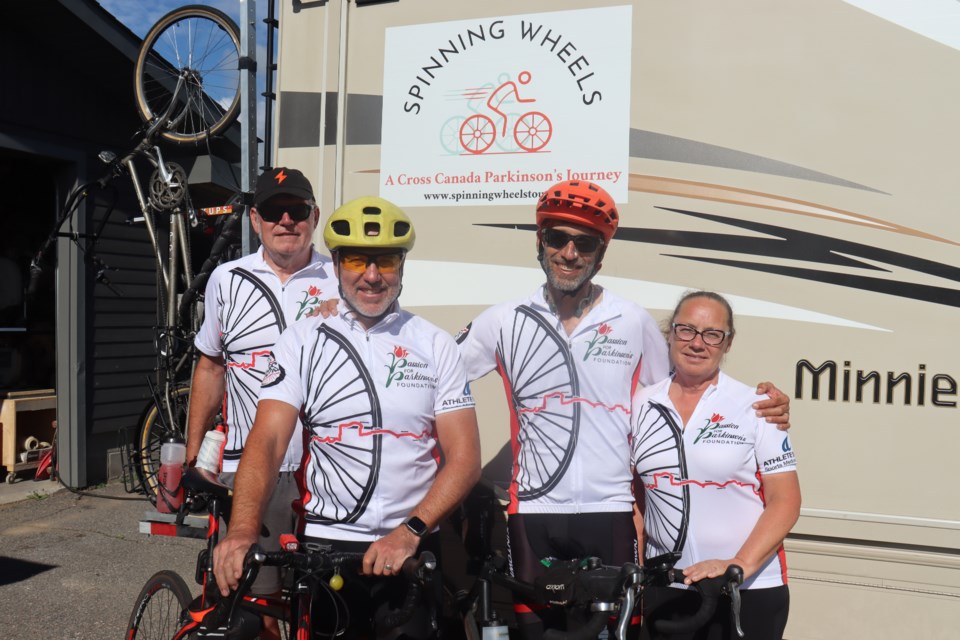“I spent five years after I was diagnosed hiding my symptoms from friends and family,” says Steve Iseman, Spinning Wheels Tour co-founder and a cyclist with Parkinson’s.
Along with three of his colleagues, Iseman is biking across Canada to help raise awareness for the neurodegenerative disorder.
The tour organizer says the hardships he has faced are a familiar tune for many Canadians living with Parkinson's.
“You lose your confidence,” he says. “You’ll stumble and fall, you’ll drop things – it just makes you a little less certain. Sometimes you can’t find the words you’re looking for, and it chips away at your confidence.”
Often headlined by a battle with symptom-related humiliation, Iseman and his team estimates that 90 per cent of people who have Parkinson’s are not sharing their stories or participating in formal groups and exercise programs.
Jim Redmond, another cyclist with the tour who was diagnosed with Parkinson’s seven years ago, echoes many of Iseman’s lived experiences.
“I’ve spent a couple years on my couch cutting off all the relationships I have with my friends and family because there’s depression and anxiety associated with Parkinson’s,” he says. “Not everyone has it, but enough do have it that it’s common.”
Because the diagnosis and its features can create feelings of shame, the team explains that many impacted individuals will go into hiding. Iseman explains this creates a trickle-down effect on the programming and operations aimed at assisting people living with the disease.
“In the shadows, Parkinson’s gets overlooked,” he says. “There’s woefully inadequate funding for research and for facilities, so we’re trying to cast a light on that issue and encourage people to come out and tell their stories.”
There is currently no cure for Parkinson’s, and some medications used to treat the disease are decades old. But Iseman notes there’s a particular method of treatment that is often undervalued.
“Cycling is so beneficial for people with Parkinson’s,” he says. “People regard it almost as a form of medicine.”
“It’s easy to fall into the depression and despair,” Redmond adds. “But once you get going, it’s also easy to stay positive, and you just have to take that first step.”
With the help from his friend Mike Loghrin, Iseman decided to form the Rigid Riders – a cycling group aimed to promote exercise and engagement for Parkinson’s patients needing an outlet.
Four years later, their ambition to travel from one coast to the other in an effort to spread awareness for the disease was realized, and the Spinning Wheels Tour was formed.
“The places that help people with Parkinson’s need some assistance,” Redmond says. “We’ve partnered with different Parkinson’s organizations across the country to try and get them a little bit of money so they can provide more services.”
Biking upwards of 150 km every day, the group began their trek in Victoria, British Columbia on June 25. They’re projected to finish in St. John’s, Newfoundland and Labrador around mid-September.
It goes without saying their three-month journey takes immense amounts of dedication, but it’s not just the cycling that has required commitment.
“My wife Darlene closed down her law practice to help make this happen,” Loghrin says. “She’s driving the RV and does our laundry and cooking. We couldn’t have done this without her.”
The venturesome group of four is in the Sault this evening, and they will continue their ride tomorrow towards Blind River. The cyclists then plan to reach Sudbury by Wednesday, and eventually Toronto by Aug. 20.
While the team is unsure whether they’ll cycle across the country again, Redmond is hopeful their initiative will spark a nationally driven conversation to tackle the stigma associated with Parkinson’s.
“We want this to be the starting point,” he says. “Whatever initiatives come next; we’re hoping to continue talking to people along the way.”
Anyone interested in donating to the Spinning Wheels Tour can visit their website here.
